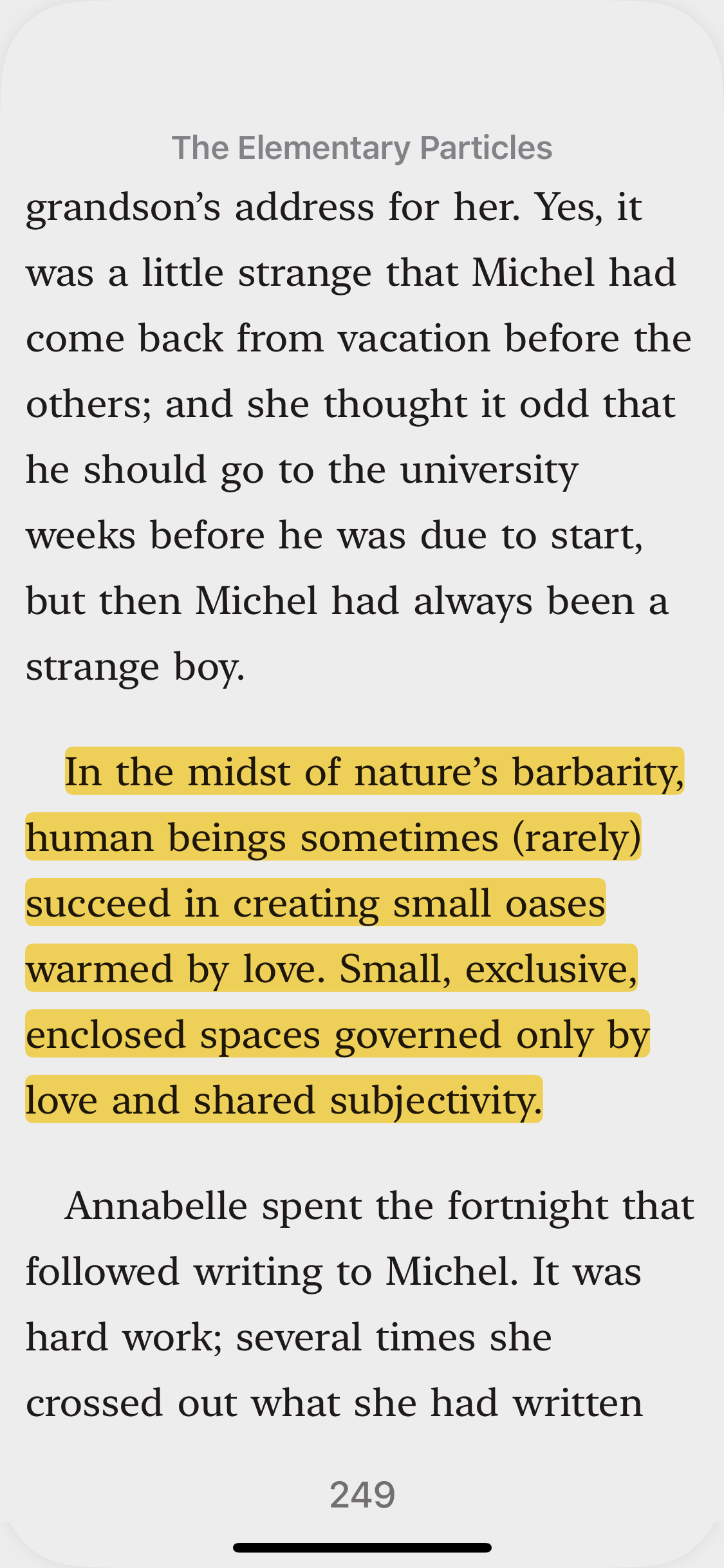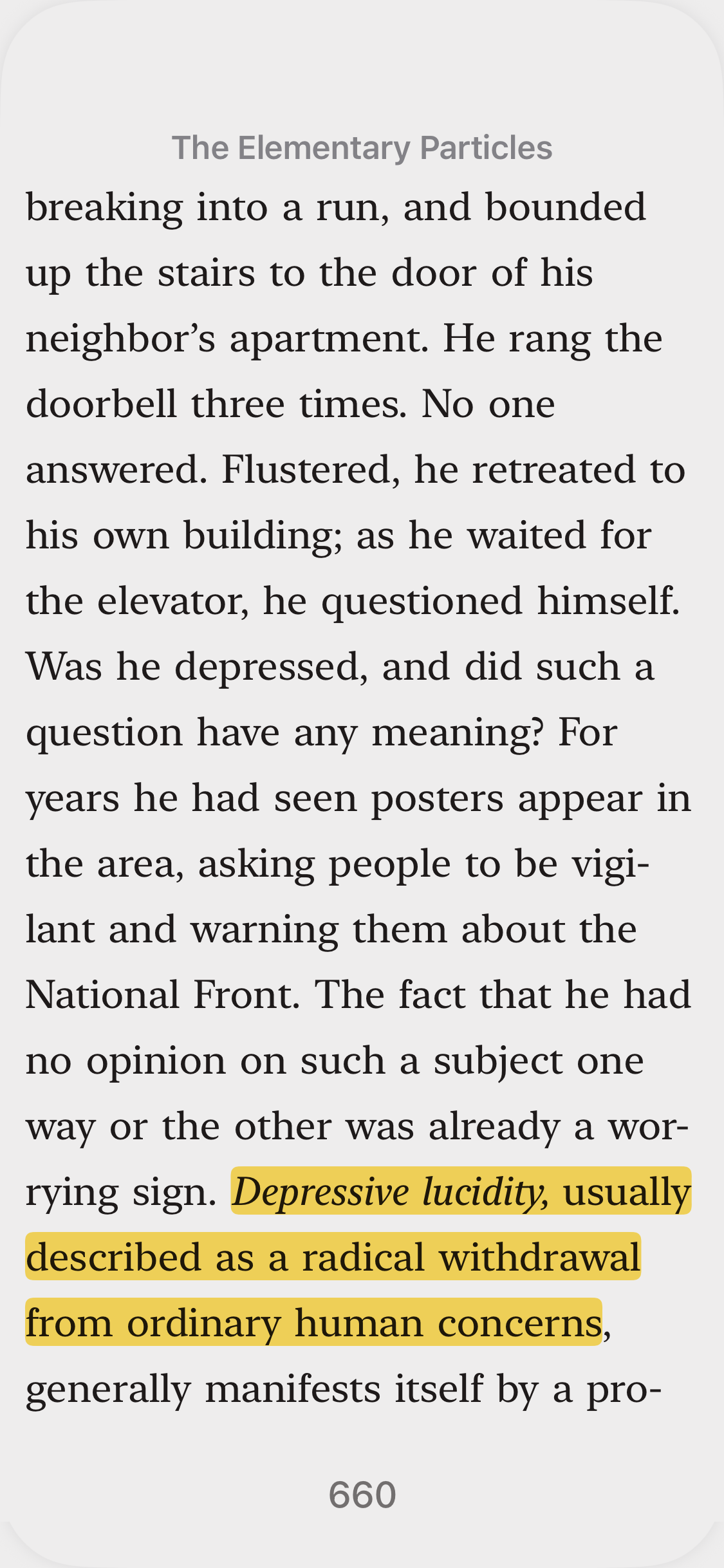Michel Houellebecq - Elementary Particles
Devastatingly direct dissection of modern capitalist sexual society.
This is the first book I’ve read by Michel Houellebecq. I was reading an article that referred to him as France’s greatest contemporary writer which was enough for me to look into this novels. On the net, the consensus was that Elementary Particles (originally in French Les Particules élémentaires) is his best work so I started there. I had no idea what it was going to be about.
Obviously this is a translation, and I always wonder how close the translation is to the original. The translator was Frank Wynne. I haven’t read the French original but I didn’t notice any odd language incongruities and given the often crude dialogue mixed with extremely technical passages, it’s my impression that the translation is spectacular. The original may be better, but for all intents and purposes it doesn’t seem to matter. Great writing is great writing.
The plot of the book generally follows two half brothers’ lives in parallel. Bruno is a troubled hedonist, Michel is a troubled intellectual. The contrast between the two is exceptional and I think we’ve all seen families where even fully related siblings seem to have quite a different temperament. I liked this plausibility and the careful portrayal of each person was utterly realistic and believable in isolation. Particularly the extremely opposite language used to describe each of the brother’s life events was very effective at mirroring their mind states. For someone who knows people like either of them, it will feel familiar and accurate.
The extremes that slowly are drawn out with each character are paced perfectly so that while they seem intense, are not jarring and unexpected. In this way, Houellebecq masterfully brings us along on the journey into their lives unraveling and the many morals that can be debated along the way.
On the surface, many of the vignettes will appear shocking or crude to the average person and most importantly which of the two characters you find more deplorable probably defines who you think you are and perhaps the distaste for the shadow side of your own personality. As a self-reflective tool it is exceptional at psychoanalyzing the reader. Many readers will not be able to get through the first 30 pages as a result of the brutal baring that I think may occur.
From cursory reading online, it seems that the book was quite controversial when it was released in 1998 and it’s very interesting to compare the social situation then to how it is in 2025. Thinking back, it would have seemed blasphemous on any number of levels from public decency, to insulting the church, to fatalism regarding technology. In 1998 it seemed there was still a deep and broad consensus about the importance of certain base human beliefs - that respect was expected for all, technology would always come through to help us, life was about freedom and choosing your own path, families were good, money was relatively benign and even respected.
I thought deeply about which of these thematical biases Houellebecq personally believed vs. which ones the characters were representing. Passages such as the following seemed to show a deep longing from Houellebecq more than the character.
However at other times, a deeply dark lack of confidence in the potentiality of human meaning or the value of individual human life seemed to be his underlying philosophy.
The various secondary characters serve as excellent supports for the main themes, each being somewhat sacrificed as a sad example of the main characters’ insufficiencies. Again, we all know of these characters in life that seem to vanish without consequence, their lives cut short or simply forgotten due to lack of effort or poor starting circumstances.
They are exceptional pawns that move along the chess-game of a novel. Like chess, the winner is only decided after all the other characters are dead. It’s not a pretty way to look at life, but the structure of the novel perfectly backs up the basic premises of what Houellebecq is arguing.
CONCLUSION
This is one of the best novels I have ever read. It’s perfectly written in a pure literary sense. The phrasing and use of contrasting vernacular to represent the characters is peerless. The multiple meanings of sentences in almost every page is like poetry that begs the reader to question whether it is the character thinking it or the author proposing it to the reader to think about. The depth and degree of attention to the themes of love, family, individual freedom, technological destruction and the validity of religion is unparalleled in one book. Most books could only begin to tackle one.
But that is the genius here. Written in 1998, it probably seemed obscene and farcical, however in 2025, it is almost a documentary of what has occurred. The wryly written Epilogue is perhaps the master stroke of an impeccable futurist that so perfectly describes how society has come to be that I thought it was added after the original publication.
I think the sadness of that accuracy, and perhaps the hope of realizing it’s never too late, make the yearning of the author at the time greatly poignant in itself. We should thank Houellebecq for thinking of this stuff for us so long ago, and presenting it in such a beautifully complete way. A little Russian doll from the past that we can open up and learn the secrets from, if we are brave enough to.
It’s not the type of book you can read twice, and most people will not have the open-mindedness to read it once, however as we read classics like The Old Man and the Sea in high school, it is almost our responsibility to read this book as foundational exercise in not screwing up our own lives and potentially saving humanity from itself.
PRICE
~$18.00 USD
AVAILABILITY
THE RATING
10/10 Absolute
10/10 Relative
Your donation helps keep the reviews coming!



